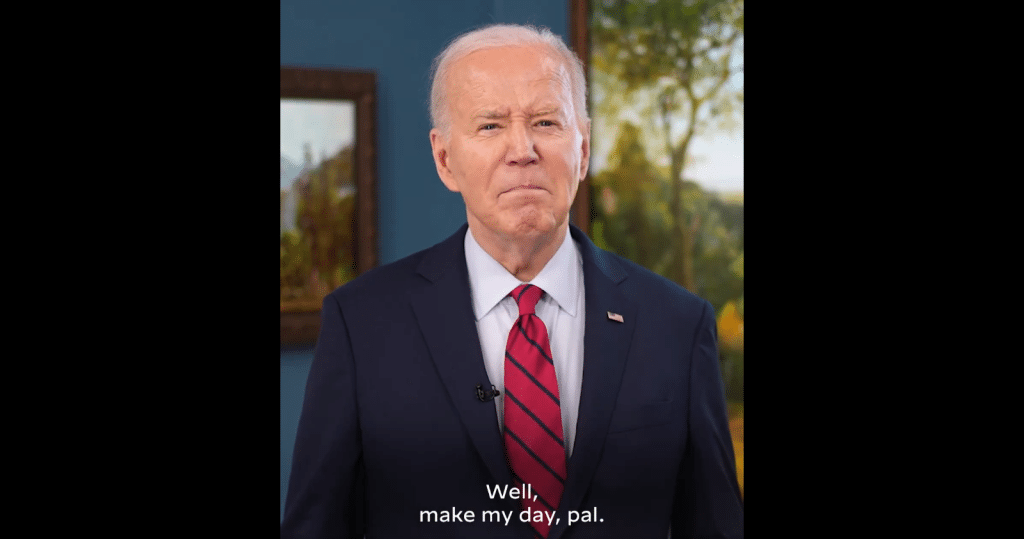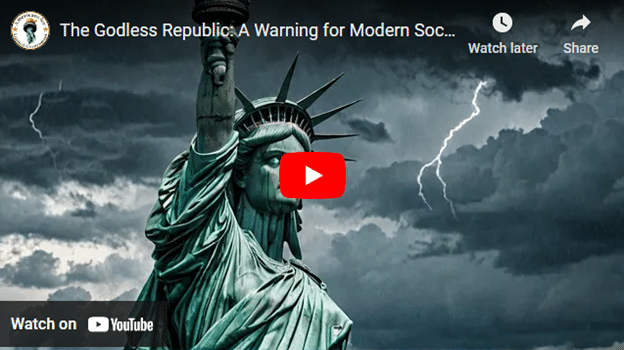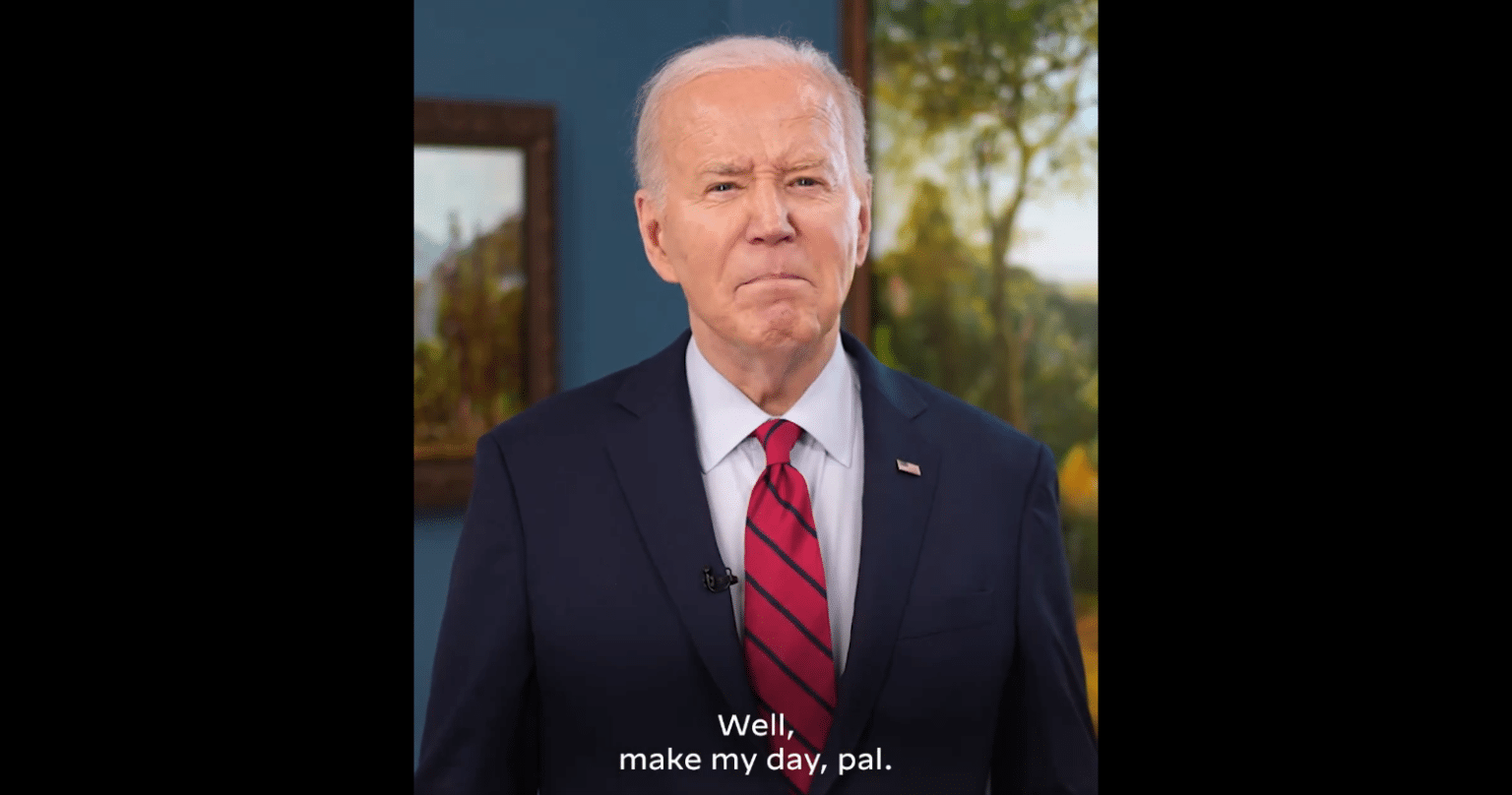May 21, 2024
Permission to republish original opeds and cartoons granted.
‘Make My Day, Pal’: Biden’s Push For Earliest Debate In History Aimed To Offset Polls Weighing Against Him Amid Inflation Dissatisfaction

By Robert Romano
In one of the biggest gambles in recent presidential history, President Joe Biden will be squaring off against former President Donald Trump in the earliest presidential debate in American history: June 27.
In fact, since 1976 — there were no debates between 1964 and 1972 — all general election presidential debates occurred in September and October of the election year. The debates in 1960 were all in September and October as well. Before that, there were no general election debates, just campaigns.
Why so early? Besides the increased prevalence of early voting — the 2020 debates occurred as early voting largely began in October during the Covid pandemic — the reason for the earliest general election debate in presidential history is obvious: President Biden has been receiving a shellacking in the polls and needs to change the nature of the race now before sour voter attitudes against him completely solidify over the summer, sealing his fate.
It's now or never.
Biden has been trailing national polls on average since about Sept. 2023, according to RealClearPolling.com, with the current average showing Trump at 46.7 percent and Biden at 45.6 percent. The implication is that Biden is doing so poorly, that even the national popular vote is in question.
The reason this is a gamble is because an early debate, rather than offsetting voter attitudes against him, could only serve to affirm them as Americans remain underwater on personal income versus inflation. Almost everything will depend not only on Biden’s competence, stamina and ability to handle questions, but specifically how he counters the fact that Americans are simply not better off than they were four years ago under Trump.
In fact, overall consumer prices are up 18.8 percent since Feb. 2021 while personal incomes are only up 17.6 percent. Ironically, in a few more months, incomes will likely finally surpass prices, but by then it might be too late for the public to change its mind about Biden.
The most recent Harvard-Harris poll taken May 15 and May 16 shows Trump leading Biden 53 percent to 47 percent, including 48 percent who say their financial situation is getting worse. Of those, 30 percent of Democrats say it is getting worse, 67 percent of Republicans say it is getting worse and 47 percent of independents say it is getting worse. Only 42 percent of Democrats, 15 percent of Republicans and 26 percent of independents say it is getting better.
But another undercurrent, besides Biden needing to shore up losses he is presently taking, is the debate will be almost two full months before the Democratic National Convention in Chicago, Ill. in August. This makes the debate by design a test Biden against Trump and then run the numbers, and if they still don’t look good, potentially force the elder Biden, now 81 years old, off the stage.
As if that would improve the situation. Incumbent presidents stepping aside didn’t help Democrats in 1952 and 1968, but at least those situations offered enough time for another candidate to build political support. A late Biden departure, on the other hand, would be towards an untested candidate who likely would have difficulty building the wide, national coalition necessary to win the Electoral College. In short, the dark horse never rides.
Meaning, for better or for worse, the Democrats might be stuck with Biden — and his ability to get reelected may in fact come down to how well he can fare in the early debate against Trump, who the Biden campaign may be hoping will be unprepared or undisciplined. This is pure panic. Right now, the race appears to be Trump’s to lose.
In challenging Trump to the debate on X.com on May 15, Biden declared, "Make my day, pal." Trump immediately accepted. Be careful what you wish for, Mr. President.
Robert Romano is the Vice President of Public Policy at Americans for Limited Government Foundation.
Video: The Godless Republic: A Warning For Modern Society

To view online: https://www.youtube.com/watch?v=sezuQKiYrWY


Kevin Frazier: The FTC defies the Constitution again
By Kevin Frazier
America ratified the Constitution with the understanding that the federal government would be one of limited, enumerated powers. That understanding was quickly upended.
Within a few decades, the commerce clause had been expanded to reach nearly every commercial activity, the necessary and proper clause had been transformed into the “elastic clause,” and the spending and taxing powers were explicitly interpreted to allow Congress more or less to regulate fields beyond its constitutional bailiwick. If those participating in the ratification debates had known that “limited, enumerated” powers meant unlimited and unchecked federal authority, they would have voted down an already controversial proposal.
Centuries later, the country has grown accustomed to a federal government with few constitutional constraints (at least ones that are consistently and clearly enforced). Creative interpretations of the Constitution continue to expand federal authority.
A few examples stand out. In NFIB v. Sebelius, the Supreme Court rewrote the Affordable Care Act so that a “mandate” could be read as a “tax.” In Gundy v. United States, the court upheld a delegation of Congress’s legislative power to the attorney general by finding a constraining “intelligible principle” in the blatantly broad directive that the attorney general “specify the applicability” of the Sex Offender Registration and Notification Act.
This is an incomplete list, but the upshot is clear: Hundreds, if not thousands, of slight deviations from the constitutional order imagined by the founders and agreed to by the people have accumulated and decimated the idea of a federal system of government.
The Federal Trade Commission’s expansive regulatory agenda is perhaps the best sign of our constitutional drift. A slew of rulemaking proceedings shows how the FTC has leaned into the incredible and, to the founding generation, unbelievable amount of power that has amassed in our fourth branch of government.
The FTC’s recently finalized rule banning noncompete agreements typifies its willingness to bypass constitutional safeguards if it means driving toward certain policy ends. The ban is forecasted to affect 30 million contracts, many of which involve workers in our most important industries. Regardless of whether the ban is good policy, it is a direct circumvention of how major economic and political questions are supposed to be addressed in our constitutional order.
We all learn that a bill becomes law by going through the intentionally arduous and inefficient legislative process. The founders concluded that the deliberation, transparency, and accountability brought on by that process far exceeded the costs. Yet the ban was subject to a different, far less onerous process — one led by unelected commissioners, overseen by unknown bureaucrats, and ignored by the vast majority of the public. Despite the manifold constitutional problems associated with this process, those who agree with the policy aims of the majority of FTC commissioners have persistently and vigorously defended the commission’s action.
In fact, the FTC’s efforts to expand its powers and test constitutional limits are just getting started — observers expect that within weeks, the FTC will announce a commercial surveillance rule that addresses many of the privacy- and data protection-related topics being discussed by Congress. This action is all the more concerning given that the commission is stepping on Congress’s toes. The American Privacy Rights Act, which addresses many of the same topics as the FTC’s likely commercial surveillance rule and is now before our elected representatives, should not have to compete with the FTC’s initiative for attention.
Our constitutional order can only drift so far from its anchor in the ideals of liberty, popular sovereignty, and federalism before it becomes unrecognizable and unsustainable. It may be the case that the FTC’s priorities and policy views are worthy, in a vacuum, of broad support. That support, however, should be secondary to adhering to constitutional processes and principles.
The FTC, and every agency for that matter, should assume a stance of regulatory humility: the idea that any administrative agency is a creature of Congress and just one part of a larger constitutional system that relies on process to protect the liberty of all. It may not be efficient, but it is how our Constitution was designed and ratified. Moreover, it’s how the chief proponents of the FTC thought of the agency.
As Chairwoman Lina Khan pointed out in the FTC’s annual report, President Woodrow Wilson supported the FTC, in part, because “the businessmen of the country desire the advice, the definite guidance and information which can be supplied by an administrative body, an interstate trade commission.” What businesses do not desire and our Constitution does not accept is an FTC or any agency that usurps the power of Congress and, by extension, the power of the people.
To view online: https://www.washingtonexaminer.com/opinion/3009874/the-ftc-defies-the-constitution-again/

